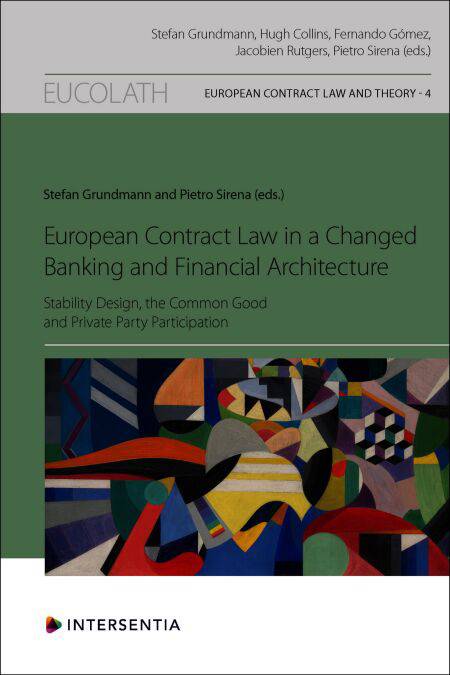
- Retrait gratuit dans votre magasin Club
- 7.000.000 titres dans notre catalogue
- Payer en toute sécurité
- Toujours un magasin près de chez vous
- Retrait gratuit dans votre magasin Club
- 7.000.0000 titres dans notre catalogue
- Payer en toute sécurité
- Toujours un magasin près de chez vous
European Contract Law in a Changed Banking and Financial Architecture EBOOK
Stability Design, the Common Good and Private Party Participation
Stefan Grundmann, Pietro Sirena
Ebook | Anglais
114,99 €
+ 114 points
Format
Description
The European Banking Union forms the answer of the EU to the global financial crisis, strongly increasing own funds basis for more robust credit institutions, installing a recovery and resolution regime with strong planning and preventive measures and opting for the supervisory with the broadest reach, the European Central Bank. The first part of the book – after the design of the overall architecture and a clarification of the main policy lines and theoretical underpinnings – describes the main features of this regime. It does so in particular for recovery tools and their conceptual novelty, focusing on private claims within the regime, namely within deposit guarantee schemes and for liability of supervisory authorities. The main question asked in the volume is, however, in what respects this new regime changed European Contract Law. The answer is two-fold, and this is the focus of the still more extensive second part. The first answer is that the main thrust – stability first and no socialization of costs and privatization of gains – constitutes a novel approach, a clear dedication to the prevalence of the public good. This is a thrust, which – with corporate social responsibility, responsibility driven lending and similar – will become the main development in the 2010s and 2020s. One can speak of a green-box approach that establishes clear firm-holds within an area characterized by autonomous choice (‘free markets’, including the Internal Market). The second answer is more multi-faceted. The range of possibilities of private party claims and participation rights rises enormously – as it did before in other regulatory areas, namely in competition law with intervention of the CJEU and the EU legislature. This ranges from credit institutions themselves more actively contributing to best practices and self-regulation, to claims of private parties (creditors, customers) against credit-institutions not complying with the regulatory regime, and finally enhanced procedures for enforcement by private parties (as private advocates general). The volume closes with a case study of the Foreign Currency Loans crisis, namely in Central Europe, which may also become a huge test case for the new architecture, but at least raises parallel questions.
With Contributions by Esther Arroyo (Universitat de Barcelona), Alessandra De Aldisio (Senior advisor Banca d'Italia), Nikolai Badenhoop (Leibniz Institute for Financial Research SAFE Frankfurt), Ewa Baginska (University of Gdansk), François Barrière (University of Lumière Lyon II), Stefan Grundmann (Humboldt-University), Carlo Lanfranchi (Banca d'Italia), Moritz Renner (University of Mannheim), Michael Schillig (King’s College London), Pietro Sirena (Bocconi University) and Piotr Tereszkiewiecz (Jagellonian University).
With Contributions by Esther Arroyo (Universitat de Barcelona), Alessandra De Aldisio (Senior advisor Banca d'Italia), Nikolai Badenhoop (Leibniz Institute for Financial Research SAFE Frankfurt), Ewa Baginska (University of Gdansk), François Barrière (University of Lumière Lyon II), Stefan Grundmann (Humboldt-University), Carlo Lanfranchi (Banca d'Italia), Moritz Renner (University of Mannheim), Michael Schillig (King’s College London), Pietro Sirena (Bocconi University) and Piotr Tereszkiewiecz (Jagellonian University).
Spécifications
Parties prenantes
- Auteur(s) :
- Editeur:
Contenu
- Langue:
- Anglais
Caractéristiques
- EAN:
- 9781839705441
- Date de parution :
- 15-09-24
- Format:
- Ebook
- Protection digitale:
- /
- Format numérique:
- ePub

Les avis
Nous publions uniquement les avis qui respectent les conditions requises. Consultez nos conditions pour les avis.






